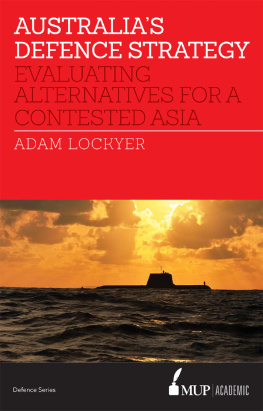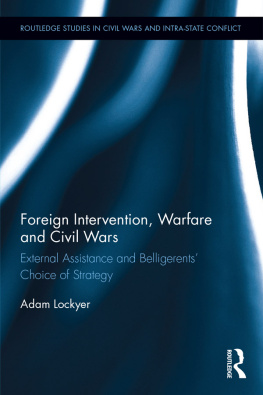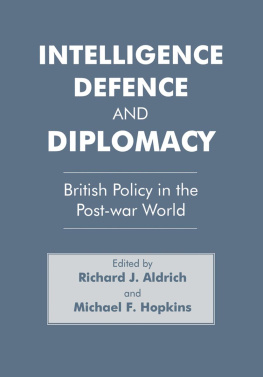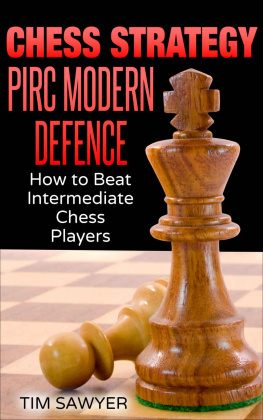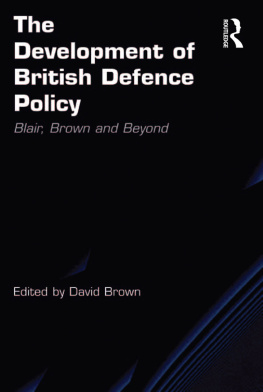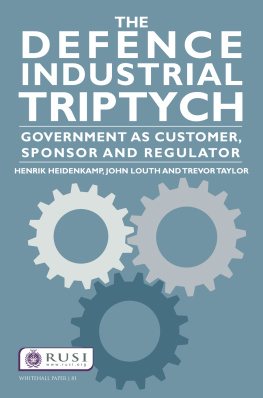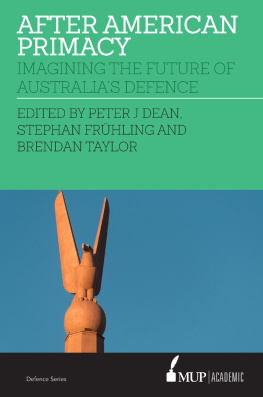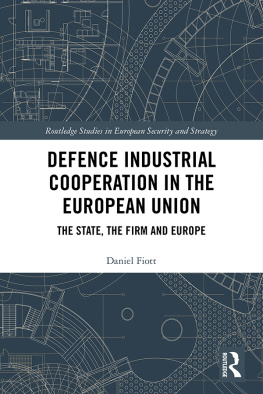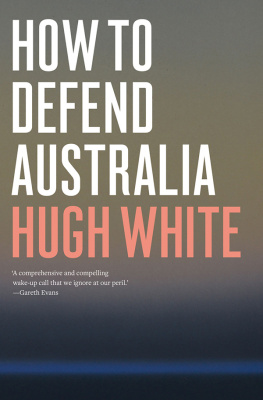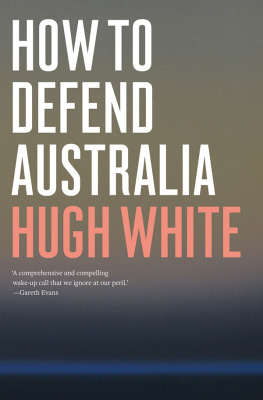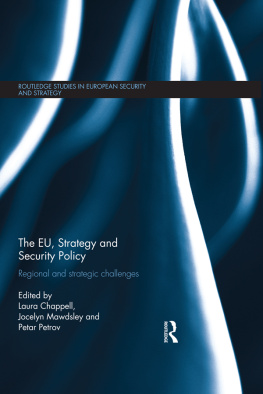Defence Studies
Series editors
Associate Professor Peter J. Dean and
Associate Professor Brendan Taylor
The aim of this series is to publish outstanding works of research on strategy and warfare with a focus on Australia and the region. Books in the series take a broad approach to defence studies, examining war in its numerous forms, including military, strategic, political and historic aspects. The series focus is principally on the hard power elements of military studies, in particular the use or threatened use of armed force in international affairs. This includes the history of military operations across the spectrum of conflict, Asias strategic transformation and strategic policy options for Australia and the region. Books in the series consist of either edited or single-author works that are academically rigorous and accessible to both academics and the interested general reader.
Dr Adam Lockyer is a senior lecturer in security studies at Macquarie University. He held the 2015 Fulbright Scholarship in US-Australian Alliance Studies at Georgetown University. He is also a research associate at the United States Studies Centre. Before joining the Department of Security Studies and Criminology at Macquarie University, Dr Lockyer was a research fellow in defence studies at the University of New South Wales. He has also held positions at the United States Studies Centre and the Center for Strategic and International Studies in Washington, DC, and was the Lowy Institutes 2008 Thawley Scholar in International Security. He spent four years serving in the Australian Army.
Dr Lockyer has published widely on issues relating to Australian defence strategy, US defence and foreign policy, post-conflict reconstruction, governance and insurgency. His research has won a number of awards, including the SAGE Award for the best international contribution to a Canadian academic journal in 2013 and the prestigious Boyer Prize for best original article published in the Australian Journal of International Affairs in 2012.
Australias Defence Strategy
Evaluating Alternatives for a Contested Asia
Adam Lockyer
MELBOURNE UNIVERSITY PRESS
An imprint of Melbourne University Publishing Limited
Level 1, 715 Swanston St, Carlton, Victoria 3053, Australia
mup-info@unimelb.edu.au
www.mup.com.au
First published 2017
Text Adam Lockyer, 2017
Design and typography Melbourne University Publishing Limited, 2017
This book is copyright. Apart from any use permitted under the Copyright Act 1968 and subsequent amendments, no part may be reproduced, stored in a retrieval system or transmitted by any means or process whatsoever without the prior written permission of the publishers.
Every attempt has been made to locate the copyright holders for material quoted in this book. Any person or organisation that may have been overlooked or misattributed may contact the publisher.
Text design by Phil Campbell
Cover design by Phil Campbell
Typeset by J&M Typesetting Printed in Australia by OPUS Group
National Library of Australia Cataloguing-in-Publication entry
Title: Australias defence strategy : evaluating alternatives for a contested Asia / Adam Lockyer.
ISBN: 9780522869323 (hardback)
ISBN: 9780522869316 (paperback)
ISBN: 9780522869330 (ebook)
Notes: Includes bibliographical references and index.
Subjects: National securityAustraliaEvaluation.
AustraliaDefensesEvaluation.
AustraliaForeign relationsAsia.
AsiaForeign relationsAustralia.
AustraliaMilitary policyEvaluation.
Creator: Lockyer, Adam, author.
This book is dedicated to
WO1 Phil Lockyer
Dad enlisted in the Royal Australian Infantry on 25 March 1970 and now, after over four and a half decades of continuous service, he is one of the last remaining Vietnam veterans still serving in the Australian Army.
Contents
Tables and maps
Acknowledgements
This book is inextricably linked to my own personal story.
In January 2014, I was offered a research fellowship in defence studies at the University of New South Wales under the tutelage of one of Australias most prominent defence thinkers, Professor Alan Dupont. I learnt a lot working with Alan and owe him a huge debt of gratitude. The Australian Army funded this fellowship and I benefited from the largesse of Lieutenant-General David Morrison and Brigadier Michael Ryan and Dr. Albert Palazzo, who established this farsighted initiative. I thank them all.
I returned to the subject of Australian defence policy and strategy after many years of working in other areas, primarily US foreign policy at the United States Studies Centre at the University of Sydney. In re-familiarising myself with the defence literature, I realised that many of the contending positions are compelling - I found myself convinced by Professor Paul Dibb over breakfast, swayed by Professor Hugh White during lunch and persuaded by Professor Michael Evans over dinner. Being pulled in so many directions prompted the central question of this book: how would we know a good defence strategy if we saw one?
Before being able to answer this question, I transferred to Macquarie University. I am lucky that Macquarie Universitys support for academic research is second to none. Professor Natalie Klein and Professor Ben Schreer have transformed the Department of Security Studies and Criminology into an outstanding engine for research production. Fortunately for me, the Department has been able to assemble a world-class collection of young, inspiring and ambitious academics and has established itself as one of Australias most exciting hubs for research on defence, strategy and security issues. It is wonderful being part of that team. I have no doubt that the department will soon fulfil its promise of becoming one of the Asias most well-respected research institutions.
After finding my feet at Macquarie University, I began thinking about how best to utilise my six-months worth of research from my earlier defence studies fellowship. It was at that time that I came across Peter Dean, Brendan Taylor and Stephan Frhlings edited volume of Australias Defence: Towards a New Era? (Melbourne University Press, 2014). I asked Peter and Brendan about publishing my research as part of their MUP Defence Studies Series. They have both been unwaveringly enthusiastic about my work and I thank them for that.
In 2015, I was awarded the Fulbright Scholarship in USAustralian Alliance Studies, which allowed me to spend a semester working at Georgetown University. During that time, along with other projects on US foreign policy, I was able to write several more chapters of this book. A huge thank you must go to my host, Dr Alan Tidwell, the Director of the Center for Australian, New Zealand and Pacific Studies (CANZPS) located in the Edmund A. Walsh School of Foreign Service at Georgetown University. The hospitality of CANZPS exceeded all my hopes. My semester there was an exceptionally productive and thought-provoking time, and I would encourage any scholar with an interest in the USAustralian alliance to apply for this Fulbright Scholarship and nominate Georgetown University as their host institution.
On returning to Macquarie University, I completed the manuscript for this book. I am enormously grateful to my research assistant, Thomas Humphries, who followed this project through to print. He provided not only outstanding research assistance but also feedback and advice on early drafts. I would also like to thank Charlotte Grech-Mahin for her research assistance on early chapters of this book. As always, my old friend Dr Anastasios Panagiotelis from Monash University has been a sounding board for ideas along the way. Guy Holt designed the maps and diagrams for this volume and I am grateful for his talent, speed and professionalism. For assistance with the cover art, I wish to thank Commander Chloe Wooten and the Royal Australian Navy. I had navely intended to camp out at Jervis Bay to photograph a silhouetted warship. Commander Wooten instead suggested this picture and arranged for the necessary approvals for me to use it. I would also like to thank all the staff at Melbourne University Press and, in particular, Catherine McInnis. Catherine has been indispensible in guiding me through the process of transforming the manuscript into a book. I have also maintained close links with the United States Studies Centre, which has contributed financially to this books production. I am grateful to the Centres CEO, Professor Simon Jackman, and the Centres former CEO, Professor Bates Gill, for their encouragement and financial support.

